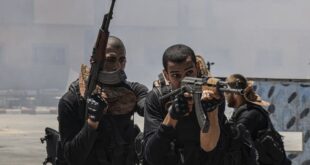 Abbas in Moscow to meet with Putin, tries to build up diplomatic pressure against any unilateral moves by Tel Aviv
Abbas in Moscow to meet with Putin, tries to build up diplomatic pressure against any unilateral moves by Tel Aviv
Â
JENIN (AFP) — Two leaders of the movement Islamic Jihad were among six Palestinians killed by Israeli troops Sunday during an eruption of violence in the northern West Bank.
Five of the victims died in the village of Qabitiya, south of the flashpoint town of Jenin where a member of the intelligence service was also killed in exchanges outside his office.
Doctors, meanwhile, announced that an American teenager who had been wounded in a Islamic Jihad suicide attack in Tel Aviv last month had died of his injuries.
News of 16-year-old Daniel Wultz’s death came as a top-level Israeli delegation began a visit to Washington designed to lay the groundwork for a White House summit later this month between the new Israeli Prime Minister Ehud Olmert and US President George W. Bush.
Sources on both sides said that the fighting in Qabitiya broke out during an arrest operation targeting Jihad followers who were holed up in a house.
The resistance leaders were identified as Moatessem Shaar and Elias Ashkar, both aged 28 and members of the Quds Brigades.
Their bodies were found in the rubble of the building which had been the focus of the fighting as Israeli bulldozers began razing the structure.
Security sources said that at least one of the other victims was a member of Islamic Jihad. Another casualty was a 21-year-old resident who was killed after he threw stones at the forces.
Meanwhile, a guard outside the Palestinian Authority’s local intelligence headquarters in Jenin was shot dead by Israeli troops.
Palestinian security sources also said Israeli special forces had tried to kill Mahmoud Saadi, the overall leader of Jihad in the Jenin area, by shooting at his vehicle in the village of Birqin.
Saadi was hit in the chest and legs but his injuries were not thought to be life-threatening, the sources said.
The Israeli army’s determination to pursue Jihad followers was bolstered by an April 17 suicide attack in Tel Aviv, which was the deadliest bombing in 20 months.
The toll from the attack rose to 11 when Wultz, who was on holiday with his family from Florida at the time of the blast, lost his fight for life.
Dror Sofer, the head of the Ichilov Hospital’s trauma wing said the teenager was able to communicate with members of his family during brief periods of consciousness during the month. “His family was with him all along the difficult period, and the hospital staff was there with them. It is very hard for all of us,” said Sofer.
The Hamas-led Palestinian government was heavily condemned by the international community in the aftermath of the Tel Aviv bombing over its failure to condemn the attack.
Hamas itself has not carried out any suicide bombings for over a year but its refusal to renounce the use of violence nor recognise Israel’s right to exist since forming its first government in March has led the US and European Union to freeze aid payments.
Despite the being unable to pay any government employees for more than two months, Hamas premier Ismail Haniya pledged his regime would not be forced into toning down its platform.
“The aim of the siege that has been imposed on us is to force the government to back down, to abandon the rights of our people and to impel us to take reckless decisions,” he said in Gaza.
Olmert, who is due to meet Bush on May 23, will tell the US president that his government cannot be expected to negotiate with the Palestinian Authority now it is governed by Hamas — classified as a “terror group†by Washington.
Three of his top aides were due to meet with senior Bush administration officials after arriving in Washington Sunday, including Secretary of State Condoleezza Rice.
They are under instructions to lay the groundwork for Olmert’s summit with Bush when the Israeli premier will try to persuade the US president to endorse his plan to fix Israel’s final borders.
The so-called convergence plan would see up to 70,000 Jews uprooted from isolated settlements in the occupied West Bank. In turn, Israel would cement control of major housing blocks where the vast majority of the quarter of a million Jewish settlers live.
The moderate Palestinian Authority President Mahmoud Abbas was, meanwhile, building up diplomatic pressure against any Israeli unilateral moves with a visit to Russia where he was due to meet with President Vladimir Putin on Monday.
 Eurasia Press & News
Eurasia Press & News
